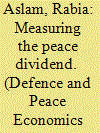| Srl | Item |
| 1 |
ID:
076429


|
|
|
|
|
| Publication |
2007.
|
| Summary/Abstract |
This paper provides a methodology for estimating the economic impact of defence spending at a sub-regional level. It does so by calculating the income and employment generated by Britain's Royal Navy and associated defence activities in the City of Portsmouth and its surrounding area, during the financial year 2003-2004. In an era of military consolidation, the paper offers an insight into the multifaceted impact of defence-related expenditure. Hence, it presents a generic framework that could prove useful to other researchers when seeking to measure the sub-regional impact of naval, airforce and army facilities in other national contexts
|
|
|
|
|
|
|
|
|
|
|
|
|
|
|
|
| 2 |
ID:
076428


|
|
|
|
|
| Publication |
2007.
|
| Summary/Abstract |
The paper attempts to trace the nexus between defense spending and economic growth in developing countries, using data for 59 developing countries from 1972-2000. The purpose is to measure the opportunity costs of defense spending mainly in terms of alternative public programs. The correlation of social sector expenditures with growth rate as well as the extent of correlation between social and defense sector spending is not clear in the majority of developing countries. It follows that even if defense spending is reduced, the prospects for a peace dividend in the aftermath of the Cold War might be inhibited by political interests that oppose increases in social sector expenditures. If so, defense cutbacks might not lead to a welfare windfall as is generally presumed. Accordingly, this paper tests whether a defense spending cutback will enhance funding for other public programs and whether such a reallocation of resources will prove to be beneficial for the long-term growth rate of the economy
|
|
|
|
|
|
|
|
|
|
|
|
|
|
|
|
| 3 |
ID:
076430


|
|
|
|
|
| Publication |
2007.
|
| Summary/Abstract |
The nexus between economic growth and military expenditure has attracted considerable attention and has been the subject of extensive theoretical and empirical work. Given the move towards the development of a Common European Security and Defence Policy (CESDP), this paper, using panel data analysis, addresses the causal ordering issue between growth and defence spending in the case of the European Union (EU15). Results reported herein suggest the presence of a positive feedback between growth and military expenditure in the long run and a positive impact of the latter on growth in the short run.
|
|
|
|
|
|
|
|
|
|
|
|
|
|
|
|
| 4 |
ID:
076431


|
|
|
|
|
| Publication |
2007.
|
| Summary/Abstract |
The purpose of this paper is to investigate regional effects of military base closures in Sweden during the last decades. Our analysis is based on a regional growth model, where two equations are estimated; one equation describing the average income growth rate and one equation describing the net migration rate. The data set is a panel of 31 Swedish municipalities covering the period 1983-1998. Our main finding is that a closure of a military base has not had any significant impact on the subsequent average income growth rate nor the net migration rate in the affected municipalities. One potential explanation for these results relates to the labour market and the composition of the labour force.
1 * The authors would like to thank Keith Schwer, participants at the WRSA annual meeting, and anonymous referees for useful comments. The Jan Wallander and Tom Hedelius Foundation is gratefully acknowledged for financial support.
|
|
|
|
|
|
|
|
|
|
|
|
|
|
|
|
| 5 |
ID:
076427


|
|
|
|
|
| Publication |
2007.
|
| Summary/Abstract |
This paper, intended to stimulate debate, suggests that we are at a turning point in the history of the UK military aerospace industry. It argues that there is urgent need for a fresh vision as to how the UK military aerospace industry can both prosper and make its maximum contribution to the defence of Britain. Further, the resulting plans and policies must emphasise the robustness of defence capabilities in a future in which the only thing we can be certain is that it will be very different from the present - especially whenever defence most matters.
|
|
|
|
|
|
|
|
|
|
|
|
|
|
|
|
| 6 |
ID:
076426


|
|
|
|
|
| Publication |
2007.
|
| Summary/Abstract |
While the general argument that it is easier and more cost-effective to prevent conflicts before the outbreak of violence has considerable attraction, a rigorous approach to estimating the cost and benefits of this policy is still lacking. The objective of this study is to contribute to the development of such an approach. The project involves six case studies, three retrospective (the Western Balkans, Afghanistan, and Rwanda) and three prospective (Afghanistan, Uzbekistan and southern Sudan). Its main conclusion is that targeted programmes of conflict prevention are (or would have been) significantly cheaper than cure.
|
|
|
|
|
|
|
|
|
|
|
|
|
|
|
|